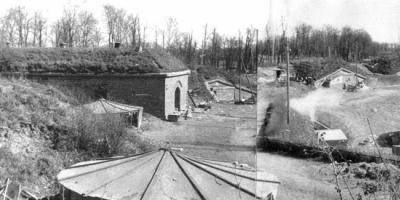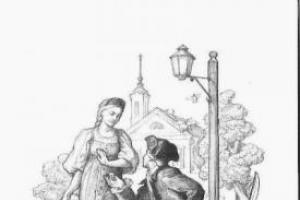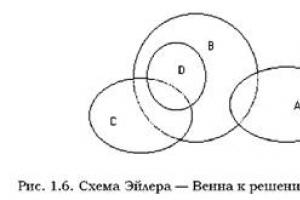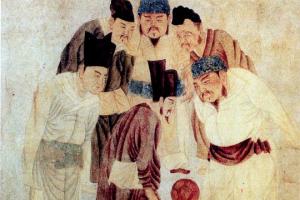Write a comment to this text, please.
On the Western Front, I had to live for some time in the dugout of technician-quartermaster Tarasnikov. He worked in the operational part of the guards brigade headquarters. His office was located right there in the dugout.
He spent whole days writing and sealing packages, sealing them with sealing wax heated over a lamp, sending out some reports, accepting papers, redrawing maps, tapping with one finger on a rusty typewriter, carefully knocking out each letter.
One evening, when I returned to our hut, thoroughly wet from the rain, and squatted in front of the stove to light it, Tarasnikov got up from the table and came up to me.
“You see,” he said somewhat guiltily, “I decided not to light the stoves for the time being.” And then, you know, the stove gives off fumes, and this, apparently, is reflected in her growth... She stopped growing completely.
- Who stopped growing?
- Why haven’t you paid attention yet? - Tarasnikov shouted, staring at me with indignation. “What is this?” Don't you see?
And he looked with sudden tenderness at the low log ceiling of our dugout.
I stood up, lifted the lamp and saw that a thick round elm tree in the ceiling had sprouted a green sprout. Pale and tender, with unsteady leaves, it stretched up to the ceiling. In two places it was supported by white ribbons, pinned to the ceiling with buttons.
- Do you understand? - Tarasnikov spoke. – It grew all the time. Such a nice branch sprang up. And then we started heating it often, but she apparently didn’t like it. Here I made notches on the log, and I have the dates stamped on it. You see how quickly it grew at first. Some days I pulled out two centimeters. I give you my honest, noble word! And since you and I started smoking here, I haven’t seen any growth for three days now. So it won't take long for her to wither away. Let's abstain. And, you know, I’m wondering: will he make it to the exit? After all, it is drawn closer to the air, where the sun is, smelled from underground.
And we went to bed in an unheated, damp dugout. The next day I myself started talking to him about his twig.
- Imagine, she stretched out almost one and a half centimeters. I told you, there is no need to drown. This is simply an amazing natural phenomenon!..
At night, the Germans brought down massive artillery fire on our location. I woke up from the roar of nearby explosions, spitting out earth, which, due to the shaking, fell abundantly on us through the log ceiling. Tarasnikov also woke up and turned on the light bulb. Everything was hooting, trembling and shaking around us. Tarasnikov put the light bulb in the middle of the table, leaned back on the bed, putting his hands behind his head:
- I think there is no great danger. Won't it hurt her? Of course, it’s a concussion, but there are three waves above us. Is it just a direct hit? And, you see, I tied her up. As if he had a presentiment...
I looked at him with interest.
He lay with his head thrown back on his hands behind the back of his head, and looked with tender care at the weak green sprout curling under the ceiling. He simply forgot, apparently, that a shell could fall on us, explode in the dugout, and bury us alive underground. No, he was only thinking about the pale green branch stretching under the ceiling of our hut. He was only worried about her.
And often now, when I meet demanding, very busy, dry at first glance, seemingly unfriendly people at the front and in the rear, I remember the technician-quartermaster Tarasnikov and his green branch. Let the fire roar overhead, let the dank dampness of the earth penetrate into the very bones, all the same - as long as the timid, shy green sprout survives, if only it reaches the sun, the desired exit.
And it seems to me that each of us has our own treasured green branch. For her sake, we are ready to endure all the ordeals and hardships of the wartime, because we know for sure: there, behind the exit, hung today with a damp raincoat, the sun will certainly meet, warm and give new strength to our branch that has reached out, grown and saved by us.
What helps a person overcome internal weaknesses? What is human behavior in extreme conditions? These and other questions are discussed in the text by L. Kassil. But in more detail, in my opinion, the author examines the problem of overcoming difficult periods in life by a person.
To draw the reader's attention to this issue, the author talks about the technician-quartermaster Tarasnikov, who seemed to be a gloomy and callous person. But then the author managed to get to know him better: he saw how carefully Tarasnikov took care of the elm sprout that came out of the ceiling. Even when the Germans brought down massive fire on Tarasnikov’s location, the quartermaster did not forget about his branch, he thought about how it would not be harmed. Watching the branch grow helped Tarasnikov live and gave him new strength and hope. The problem of overcoming difficult periods in life is relevant in our time, because people often face adversity, and it is difficult for them to find solace or something that will give them energy and strength to overcome failures. People often encounter this problem during wars, illnesses and other difficult situations.
The author believes that a person can overcome the weaknesses of life, feeling the life-giving power of nature, overcome fear and loneliness, observing how, in unsuitable circumstances for life, a branch grows on a felled tree, straining all vital forces.
To prove this point, I will turn to fiction. Thus, the hero of the story by A.P. Platonov, Yushka, who was sick with consumption, breathed in the smell of flowers, looked at the faces of butterflies and beetles, listened to the chirping of grasshoppers and the singing of birds, and this made his soul feel light, and the fragrance of herbs and flowers helped him not feel your illness. Thus, nature gave Yushka the strength to live on and helped him cope with the disease for some time.
Let me give you another example from Russian literature. The heroine of E.I. Nosova’s story “Living Flame,” Olga Petrovna, was very homesick for her son Alexei, who died heroically in the war. The narrator, who rented a room from Olga Petrovna, offered to plant poppies for her. The flowers bloomed, but they only bloomed for two days and then fell off. And then Olga Petrovna involuntarily compared the life of her son to a poppy blossom: it is just as bright, but short, ending abruptly. And this made Olga Petrovna understand that her son lived a truly bright, eventful life and did not die in vain. Thus, comparing Alexei’s life with a poppy flower gave Olga Petrovna strength and helped her cope with grief over the death of her son.
Indeed, the life-giving power of nature can help a person overcome difficult periods, find strength to live on and find comfort.
On the Western Front, I had to live for some time in the dugout of technician-quartermaster Tarasnikov. He worked in the operational part of the guards brigade headquarters.


Composition
All people cope with difficulties in life differently - some do it effortlessly, while others find it difficult. In this text, L.A. Cassil invites us to think about the problem of overcoming difficult periods in life.
The narrator introduces us to the story of the war years, in which he had to face an unusual way of overcoming difficulties. The hero lived in the same dugout with the quartermaster technician, and at one moment he drew his attention to a green twig that had sprouted in the ceiling. The author draws our attention to the fact that for the sake of the “peace” of this twig, Tarasnikov even asked the narrator, despite the terrible cold, not to light the stove for a while, because “it [the twig] stopped growing completely.” This fact could not help but cause the hero’s amazement, but he was even more surprised that during the artillery fire, which was about to take both heroes’ lives, Tarasnikov was only worried about the safety of his sprouted branch. L.A. Kassil emphasizes that this sprout became for the quartermaster technician a symbol of the struggle for life - if the plant was able to strain all its strength and sprout despite all the circumstances, then how can he be afraid of death? That is why Tarasnikov remained calm in spirit until the very end - the twig reminded him that “there, behind the exit, hung today with a damp raincoat, the sun will certainly greet you, warm you and give you new strength...”.
The author believes that a person is able to overcome internal weaknesses, feeling the vital force of nature, and overcome the feeling of fear and loneliness, observing how, in unsuitable circumstances, a branch grows on a felled tree, straining all vital forces.
I completely agree with the opinion of L.A. Kassil, and I also believe that sometimes, even in the most difficult circumstances, the presence of a kind of symbol of life, the presence of faith, can help a person, no matter what, maintain calm and hope.
In the story by A.S. Pushkin’s “The Captain’s Daughter” helped the heroes survive the uprising, captivity, and death of loved ones through pure, strong, sincere love. Pyotr Grinev, driven by the hope of saving his beloved, driven by faith in a happy future, endured any difficulties, went into battle with his own fate, was not afraid of anything and stopped at nothing. Mary, his beloved, preserved her honor, dignity and faith until the last. And even while being captured by Shvabrin, she loved, believed and waited for Peter - and these feelings did not allow her to give up and gave the heroine strength. Both Peter and Mary, aware of their own situation, defended each other in court to the last and did not for a moment succumb to a feeling of fear and hopelessness - they were driven by something much stronger than this.
In the novel by F.M. In Dostoevsky, one of the main characters, Sofya Marmeladova, was helped through a difficult period in her life by faith. The girl’s unique “germ” was the example of Jesus Christ - and therefore, while going through all the trials in life, she maintained self-control, purity of soul and moral freedom.
Thus, we can conclude that hope embodied in anything helps a person to overcome difficult periods in life: whether in a sprout, in faith or in love. A person who has support and support, no matter what it is embodied in, is capable of much.
Lev Abramovich Kassil
green twig
On the Western Front, I had to sew for some time in the dugout of the technician-quartermaster Tarasnikov. He worked in the operational part of the guards brigade headquarters. His office was located right there in the dugout. A three-line lamp illuminated the low frame. It smelled of fresh wood, earthy dampness and sealing wax. Tarasnikov himself, a short, sickly-looking young man with a funny red mustache and a yellow, stoned mouth, greeted me politely, but not too friendly.
“Set yourself here,” he told me, pointing to the trestle bed and immediately bending over his papers again. “Now they’ll set up a tent for you.” I hope my office won't bother you? Well, I hope you won’t bother us too much either. Let's agree this way. Have a seat for now.
And I began to live in Tarasnikov’s underground office.
He was a very restless, unusually meticulous and picky worker. He spent whole days writing and sealing packages, sealing them with sealing wax heated over a lamp, sending out some reports, accepting papers, redrawing maps, tapping with one finger on a rusty typewriter, carefully knocking out each letter. In the evenings he was tormented by attacks of fever, he swallowed quinine, but categorically refused to go to the hospital:
- What are you, what are you! Where will I go? Yes, this is where the whole thing will happen without me! Everything depends on me. I should go away for a day, but then you won’t be able to unravel here for a year...
Late at night, returning from the front line of defense, falling asleep on my trestle bed, I still saw Tarasnikov’s tired and pale face at the table, illuminated by the fire of the lamp, delicately, for my sake, lowered, and shrouded in tobacco fog. Hot smoke came from a clay stove stacked in the corner. Tarasnikov's tired eyes watered, but he continued to write and seal the bags. Then he called a messenger, who was waiting behind a raincoat hung at the entrance to our dugout, and I heard the following conversation.
- Who is from the fifth battalion? - asked Tarasnikov.
“I’m from the fifth battalion,” answered the messenger.
– Accept the package... Here. Take it in your hands. So. You see, it says here: “Urgent.” Therefore, deliver immediately. Hand it over personally to the commander. It's clear? If there is no commander, hand it over to the commissar. There won't be a commissioner - look for him. Do not pass it on to anyone else. Clear? Repeat.
“Deliver the package urgently,” the messenger repeated monotonously, as in a lesson. “Personally, the commander, if it’s not there, the commissar, if it’s not there, find it.”
- Right. What will you carry the package in?
- Yes, usually... Right here, in my pocket.
- Show me your pocket. - And Tarasnikov approached the tall messenger, stood on tiptoe, put his hand under the raincoat, into the bosom of his overcoat, and checked if there were any holes in his pocket.
- Yes, okay. Now keep in mind: the package is secret. Therefore, if you get caught by the enemy, what will you do?
What are you talking about, comrade technician-quartermaster, why would I get caught!
There is no need to get caught, absolutely true, but I ask you: what will you do if you get caught?
Yes, I will never get caught...
- And I ask you, if? So, listen. If there is any danger, eat the contents without reading. Tear the envelope and throw it away. Clear? Repeat.
– In case of danger, tear the envelope and throw it away, and eat what’s in between.
- Right. How long will it take to deliver the package?
- Yes, it’s about forty minutes and it’s only a walk.
- More precisely, I ask.
- Yes, comrade technician-quartermaster, I think it will take me no more than fifty minutes.
- More precisely.
- Yes, I’ll definitely deliver it in an hour.
- So. Notice the time. – Tarasnikov clicked his huge conductor’s watch. - It’s twenty-three fifty now. This means that they are obliged to deliver no later than zero fifty minutes. Clear? You can go.
And this dialogue was repeated with every messenger, with every liaison. Having finished with all the packages, Tarasnikov packed up. But even in his sleep, he continued to teach the messengers, took offense at someone, and often at night I was woken up by his loud, dry, abrupt voice:
- How are you standing? Where have you come? This is not a hair salon, but a headquarters office! – he said clearly in his sleep.
- Why did you enter without announcing? Log out and log in again. It's time to learn order. So. Wait. Do you see the man eating? You can wait, your package is not urgent. Give the man something to eat... Sign... Departure time... You can go. You are free…
I shook him, trying to wake him up. He jumped up, looked at me with a little meaningful look and, falling back onto his bed, covering himself with his overcoat, instantly plunged into his staff dreams. And again he began to speak quickly.
All this was not very pleasant. And I was already thinking about how I could move to another dugout. But one evening, when I returned to our hut, thoroughly wet from the rain, and squatted in front of the stove to light it, Tarasnikov got up from the table and came up to me.
“So it turns out like this,” he said somewhat guiltily. – You see, I decided not to light the stoves for the time being. Let's abstain for five days. And then, you know, the stove gives off fumes, and this, apparently, affects her growth... It has a bad effect on her.
I, not understanding anything, looked at Tarasnikov:
- Whose height? On the growth of the stove?
- What does the stove have to do with it? - Tarasnikov was offended. – I think I express myself quite clearly. This same child, he apparently doesn’t act well... She stopped growing completely.
- Who stopped growing?
“What, haven’t you paid attention yet?” Tarasnikov shouted, staring at me with indignation. -And what's that? Don’t you see? - And he looked with sudden tenderness at the low log ceiling of our dugout.
I stood up, lifted the lamp and saw that a thick round elm tree in the ceiling had sprouted a green sprout. Pale and tender, with unsteady leaves, it stretched up to the ceiling. In two places it was supported by white ribbons, pinned to the ceiling with buttons.
- Do you understand? - Tarasnikov spoke. – It grew all the time. Such a nice branch sprang up. And then we started heating it often, but she apparently didn’t like it. Here I made aarubochki on a log, and I have the dates stamped on them. You see how quickly it grew at first. Some days I pulled out two centimeters. I give you my honest, noble word! And since you and I started smoking here, I haven’t seen any growth for three days now. So it won't take long for her to wither away. Let's abstain. And I should smoke less. The little stalk is delicate, everything affects it. And, you know, I’m wondering: will he make it to the exit? A? After all, this is how the little devil reaches out closer to the air, where he senses the sun from under the ground.
And we went to bed in an unheated, damp dugout. The next day, in order to gain Tarasnikov’s favor, I myself started talking to him about his twig.
“Well,” I asked, throwing off my wet raincoat, “is it growing?”
Tarasnikov jumped out from behind the table, looked me carefully in the eyes, wanting to check if I was laughing at him, but seeing that I was speaking seriously, with quiet delight he lifted the lamp, moved it a little to the side so as not to smoke his twig, and almost whispered to me:
– Imagine, she stretched out almost one and a half centimeters. I told you, there is no need to drown. This is simply an amazing natural phenomenon!…
At night, the Germans brought down massive artillery fire on our location. I woke up from the roar of nearby explosions, spitting out earth, which from the shaking fell abundantly on us through








